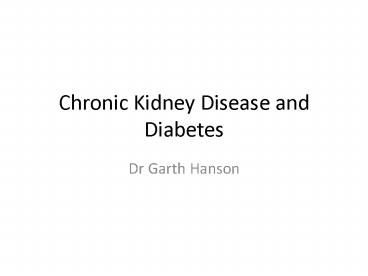Chronic Kidney Disease and Diabetes - PowerPoint PPT Presentation
1 / 47
Title:
Chronic Kidney Disease and Diabetes
Description:
Chronic Kidney Disease and Diabetes ... DM 2 UKDPS 21% reduction in progression of nephropathy, ACCORD 32% reduction in nephropathy with lower HA1C ... – PowerPoint PPT presentation
Number of Views:212
Avg rating:3.0/5.0
Title: Chronic Kidney Disease and Diabetes
1
Chronic Kidney Disease and Diabetes
- Dr Garth Hanson
2
Talk
- Pathology of Diabetes Mellitus (DM)
- DM and Renal Disease
- Treatment of Hyperglycemia in DM
- DM Treatment CKD Stage III IV, Stage V HD,
Stage V PD and Renal Transplant - Special Considerations
3
Pathology of Diabetes
4
Hyperglycemia
5
Hyperglycemia
Reduced insulin production
Pancreas
6
muscle
Reduced uptake glucose
Hyperglycemia
Reduced insulin production
Pancreas
7
muscle
liver
Reduced glycogen production or increased
gluconeogenasis
Reduced uptake glucose
Hyperglycemia
Reduced insulin production
Pancreas
8
Hyperglycemia
9
Non enzymatic glycation of tissues (AGE products)
Hyperglycemia
10
Non enzymatic glycation of tissues (AGE products)
Cytokine production (VGEF, TGF-beta)
Hyperglycemia
11
Non enzymatic glycation of tissues (AGE products)
Cytokine production (VGEF, TGF-beta)
Hyperglycemia
Tissue ischemia due to microvascular damage
12
Non enzymatic glycation of tissues (AGE products)
Cytokine production (VGEF, TGF-beta)
Hyperglycemia
Tissue ischemia due to microvascular damage
?
13
(No Transcript)
14
(No Transcript)
15
Basement membrane thickening
Glomerular sclerosis
Mesangial expansion
Arteriolar hyalineosis
16
DM Pathology
17
DM and Renal Outcomes
18
DM and Renal Disease
19
Treatment of Hyperglycemia in DM
20
intestine
muscle
Reduce Glucose
GLP
liver
DPP4
pancrease
kidney
21
intestine
muscle
Reduce Glucose
GLP
liver
insulin
DPP4
pancrease
kidney
22
intestine
muscle
Alpha glucosidase inhib
Reduce Glucose
GLP
liver
insulin
DPP4
pancrease
kidney
23
intestine
muscle
Alpha glucosidase inhib
Reduce Glucose
GLP
liver
insulin
metformin
DPP4
pancrease
kidney
24
intestine
muscle
Alpha glucosidase inhib
Reduce Glucose
GLP
liver
insulin
metformin
DPP4
pancrease
kidney
sulfonylureas
meglithinides
25
intestine
muscle
thioazolinadimediones
Alpha glucosidase inhib
Reduce Glucose
GLP
liver
insulin
metformin
DPP4
pancrease
kidney
sulfonylureas
meglithinides
26
intestine
muscle
thioazolinadimediones
Alpha glucosidase inhib
Reduce Glucose
GLP
liver
insulin
metformin
GLP 1 agonists
DPP4
pancrease
kidney
DPP4 inhib
sulfonylureas
meglithinides
27
intestine
muscle
thioazolinadimediones
Alpha glucosidase inhib
Reduce Glucose
GLP
liver
insulin
metformin
GLP 1 agonists
DPP4
SGLT2
pancrease
kidney
DPP4 inhib
sulfonylureas
meglithinides
28
DM Treatment in CKD
29
CKD Stage III - IV
- RAS Blockage/HTN control
- Lipids
- Antiplatelet /Anticoagulation
- Glucose Control
30
CKD Stage III - IV
- RAS Blockage/HTN control
- Each 10 mmHg of systolic BP 13 reduction in
microvascular complications (UKPDS) - After ACCORD, target 140 mmHg and above 120 mmHg.
31
CKD Stage III - IV
- RAS Blockage/HTN control
- ACE and ARB reduce progression by 16 to 30.
- Dual RAS blockage not helpful (ONTARGET,
NEHRON-D, ALTITUDE) - African Americans may not benefit as much.
- Long acting agents usually chosen (Ramipril,
Perindopril)
32
CKD Stage III - IV
- Lipids
- Secondary prevention of CVD events definitely
beneficial (TNT trail) target to 1.8 LDL - Primary prevention of CVD likely beneficial
(CARDS, SHARP). - Combination therapy not likely of benefit
(ACCORD, ENHANCE).
33
CKD Stage III - IV
- Lipids
- Statin therapy does not appear to reduce
progression to ESRD (SHARP, CARDS). - Watch high dose rosuvastatin and simvastatin
- atorvastatin safe at all doses
34
CKD Stage III - IV
- Antiplatelet /Anticoagulation
- Secondary prevention beneficial
- Primary prevention in doubt except for highest
risk. - Newer agents have little data
35
CKD Stage III - IV
- Glucose Control
- DM 1 - 8 HA1C vs 9-10 reduced progression of
nephropathy by 50. - DM 2 UKDPS 21 reduction in progression of
nephropathy, ACCORD 32 reduction in nephropathy
with lower HA1C (under 7) BUT mortality
unchanged or increased.
36
CKD Stage III - IV
- Glucose Control
- metformin should be stopped at GFR 30 ml/min
- Insulin has prolonged halflife
- Thiazolindinediones may cause volume and bone
issues - SGLT2 inhibitors less efficacious under GFR 45
ml/min
37
CKD V-Hemodialysis
- RAS Blockage/HTN control
- Lipids
- Antiplatelets /Anticoagulation
- Glucose Control
38
High Quality Evidence in HD
39
DM and Hemodialysis
- DM monitoring
- HA1C may be inaccurate due to RBC turnover,
uremic toxins, acidosis - Low sugars more common due to prolonged insulin
lifespan - Tolerate very high glucose levels due to no urine
output - DM control
- Insulin safest but use reduced dose
- Linagliptin (Trajenta) safe
- Repeglinide (Gluconorm) safe
40
CKD V-Peritoneal Dialysis
- RAS Blockage/HTN control
- Lipids
- Antiplatelets /Anticoagulation
- Glucose Control
41
High Quality Evidence in PD
42
DM and PD
- DM monitoring
- HA1C inaccurate with high turnover of RBC with
epo agents - Icodextran converted to maltose messes up meters
- DM Treatment
- May need massive insulin doses with glucose load
in PD fluid
43
CKD V-Transplant
- RAS Blockage/HTN control
- Lipids
- Antiplatelets /Anticoagulation
- Glucose Control
44
DM and Transplants
- Prednisone will increase glucose intolerance
- Calcinurin inhibitors (tac gt cyclo) cause DM due
to islet cell toxicity - No metformin
- Repeglinide, trajenta, insulin ok
45
Special Considerations
- Hyperglycemia
- Very high levels can be tolerated
- High K due to osmotic shift
- Low Na due to osmotic shift
- Treat with insulin infusion not fluid load
- Hypoglycemia
- Anorexia due to uremia. Watch for malignancy and
infection - Avoid long acting oral agents and long acting
insulin
46
Special Considerations
- Hypo alternating with Hyper
- Gastroporesis may alter glucose absorption,
gastric emptying study will diagnose. Treat with
promotility agents. - Watch for non compliance with PD as cause (lower
sugar load).
47
QUESTIONS?































